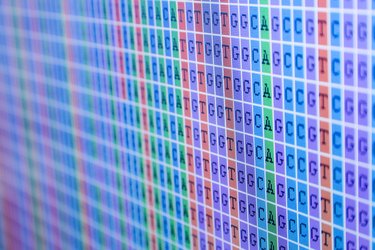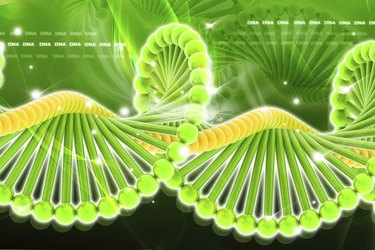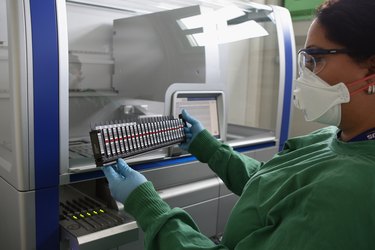
Each cell in your body contains a number of biomolecules -- organic compounds that make up the structure and carry out the function of your cells. Among these molecules are nucleotides, the components your body uses to make genetic material -- DNA and RNA. Nucleotides are found in some form in every cell in your body, and your health relies on the intake of nucleotides from your food.
Types of Nucleotides
Video of the Day

Two major classes of nucleotides make up DNA and RNA: purines and pyrimidines. Pyrimidine nucleotides contain a single-ring molecular structure bonded to a sugar molecule, whereas purines contain a double-ringed structure bonded to the sugar molecule. DNA contains two purines, called adenine and guanine, as well as two pyrimidines, thymine and cytosine. RNA contains similar nucleotides, with the purine uracil found in place of thymine. The presence of all five nucleotides proves important for cellular function.
Video of the Day
Importance of Nucleotides

Nucleotides perform a range of functions in your cells. One primary purpose of nucleotides is to store genetic information; specific sequences of nucleotides make up genes that help to guide your cells' behavior. In addition, the nucleotides in RNA contribute to multiple steps in protein generation within your cells. Since the proteins made partially as a result of nucleotides make up the structure and function of your cells, nucleotides prove important for maintaining cell and tissue health. An inability to generate new DNA and RNA, due to a lack of available nucleotides, can lead to tissue damage and disease.
Nucleotide Digestion from Food

You absorb nucleotides from the food you eat, and dietary sources provide the nucleotides your cells need to survive. The nucleotides in food are typically present as long strands of genetic material, which can contain several million nucleotides. After a meal, your pancreas secretes two types of enzymes, deoxyribonucleases, which break down DNA, and ribonucleases, which break down RNA. These enzymes cleave the DNA or RNA from your food into shorter chains of nucleotides, which your body then absorbs and transports to your cells for use.
Food Sources of Nucleotides

Since almost all foods and beverages are made up of either intact cells or cellular contents, almost all foods provide a source of nucleotides. In general, you should consume adequate nucleotides regardless of the specific foods that make up your diet. Consume grains, meats, fish, nuts, legumes, fruits and vegetables, fruit juices and milk as sources of nucleotides, as well as sources of several other nutrients.
Special Circumstances
In rare cases, individuals may lack the ability to digest DNA and RNA from their food properly, preventing their bodies from breaking down and absorbing nucleotides. For example, the rare genetic disorder pancreatic agenesis prevents the production and secretion of digestive enzymes. Individuals who have the disorder often take digestive enzymes to aid in the digestion of DNA and RNA, as well as the proteins, carbohydrates and fats in food.